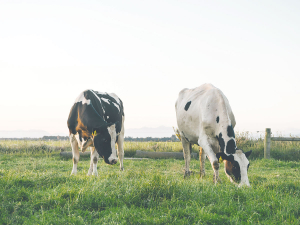Managing Magnesium, Calcium, and Phosphorus in Late Lactation Dairy Cows
OPINION: Late lactation is often viewed as a low-demand phase, when cows are winding down, and we dial down our supplements accordingly.
 The health and efficiency of the rumen directly impacts how well the cow performs through the challenges of mating and reproductions.
The health and efficiency of the rumen directly impacts how well the cow performs through the challenges of mating and reproductions.
As we head into the latter half of the year, many farmers will be starting to think about mating season for their cows.
It's no secret that animals in peak condition will achieve the best results during this time, but sometimes it can be a challenge to get them there. Often the primary challenge is to ensure that the animal is receiving the correct mix of nutrients required to balance out their diet.
All feed management and supplementation in dairy cattle should be targeted at maintaining healthy rumen performance.
The rumen, along with the reticulum and the omasum, are the fore stomachs of ruminant animals. These compartments are designed to mix, regurgitate and then ferment and digest fibrous materials such as grass and silages, and more recently grain-based concentrates.
The management of minerals and vitamins during this time is an important key to the successful mating and reproduction results of your cows.
The health and efficiency of the rumen directly impacts how well the cow performs through the challenges of mating and reproduction. A cow with suboptimal rumen performance will be at much higher risk of being an empty cow at the end of the season.
Successful management of nutrition across the whole season will ensure effective herd reproductive performance, and healthy rumen function is key to the success of every milestone the cow must achieve throughout the season. Along with nutrients of bacteria created during the process of rumination are a major nutrient source for ruminants. The bacteria is digested further down the gastrointestinal tract, supplying the all-important bypass protein requirements.
Along with balanced nutrition, the other most important issue around rumen performance is maintaining stable rumen pH diets throughout lactation, especially as these can often lack in the lead up to mating season.
To ensure good mating performance, diets need to be formulated to balance rumen pH. This may require higher levels of quality fibre, rumen buffers, or a combination of both. The period of mating should also be considered as the months leading up to mating as well as the first trimester of the pregnancy. Any lack of nutrition or imbalance in rumen pH during this period will potentially compromise the pregnancy.
Regularly checking the body condition score to ensure that your cows have enough energy during this time is crucial. Dropping by more than 1 condition score during mating season can mean the difference in successful or unsuccessful conception rate for your herd.
Two ways to ensure this doesn't happen is to either increase the energy supply available to your cows with supplementary feeds and paddock rotation, or to decrease their energy demand by going to a once-a-day milking.
Improving the reproductive performance of your cows will no doubt make a significant impact to the management of your farm. Though every farm is different and requires a slightly different plan for mating season, one thing remains the same across the board - the nutrition requirements of your cows. Getting this right and effectively managing your herd's nutrition throughout mating season is a logical and effective way to help bolster reproductive success for your farm.
Chris Balemi is managing director of Agvance Nutrition Limited.
Budou are being picked now in Bridge Pā, the most intense and exciting time of the year for the Greencollar team – and the harvest of the finest eating grapes is weeks earlier than expected.
The Real Estate Institute of New Zealand (REINZ) has released its latest rural property report, providing a detailed view of New Zealand’s rural real estate market for the 12 months ending December 2025.
Rural retailer Farmlands has released it's latest round of half-year results, labeling it as evidence that its five-year strategy is delivering on financial performance and better value for members.
OPINION: "We are back to where we were a year ago," according to a leading banking analyst in the UK, referring to US president Donald Trump's latest imposition of a global 10% tariff on all exports into the US.
DairyNZ says the Government’s proposed Resource Management Act reform needs further work to ensure it delivers on its intent.
Overseas Trade Minister Todd McClay says he's working constructively with the Labour Party in the hope they will endorse the free trade agreement (FTA) with India when the agreement comes before Parliament for ratification.